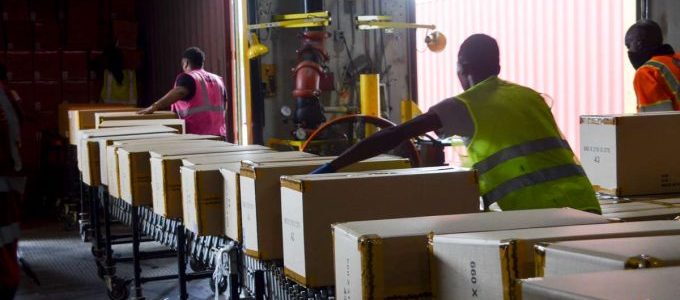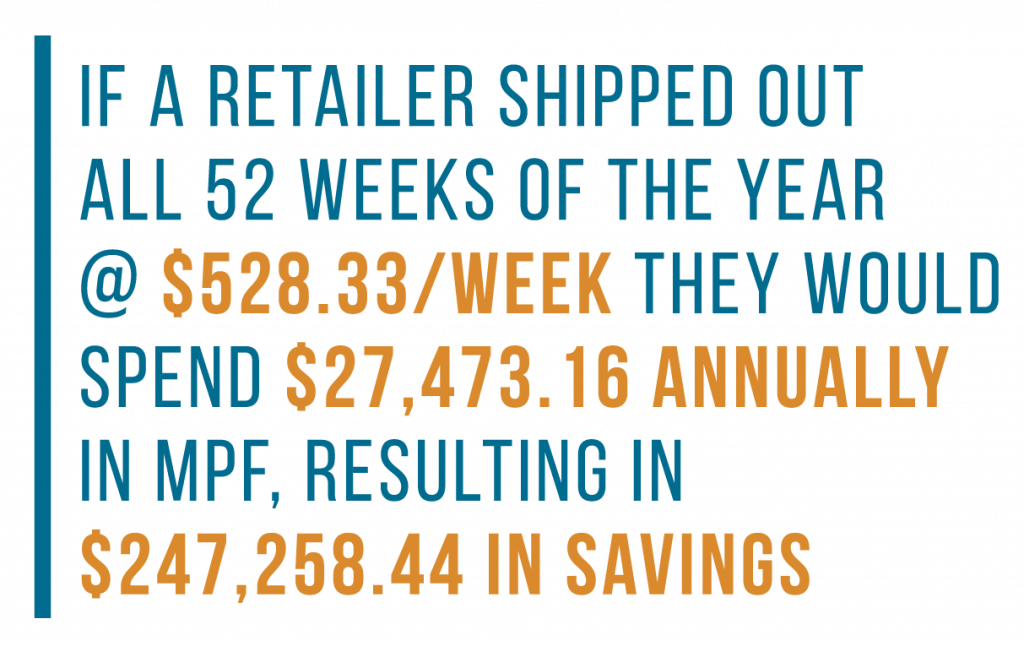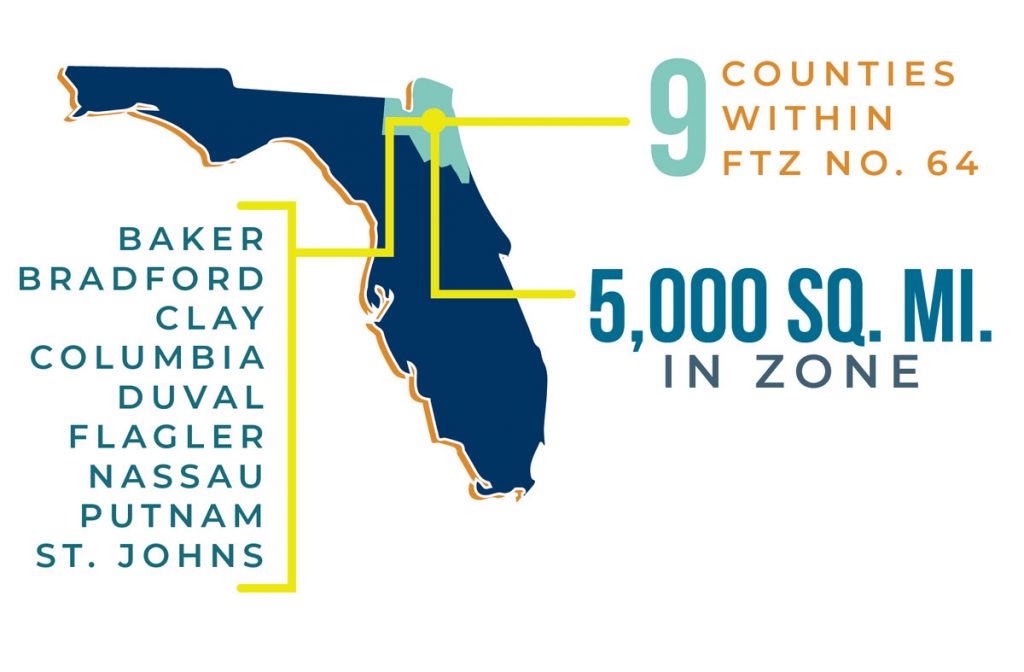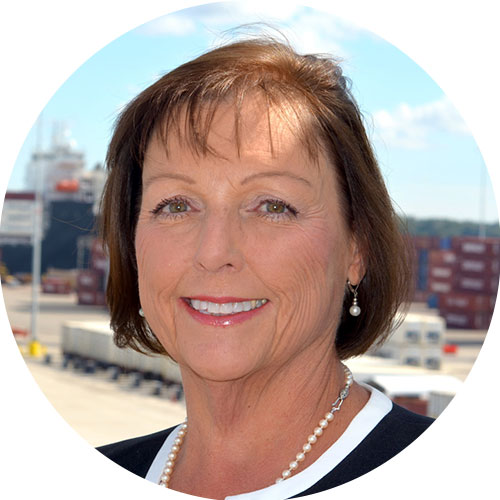News & Updates
How ecommerce retailers can leverage an FTZ to find cost savings
- JAXPORT

Retail imports have spiked for the month of August with Global Port Tracker estimating 2.06 million TEU (twenty-foot equivalent units) moved across U.S. port docks throughout the month.
In response to the new data, National Retail Federation Vice President for Supply Chain and Customs Policy Jonathan Gold noted that ”retailers are importing far more merchandise for the holidays than we expected even a month ago.”
Global Port Tracker forecasts call for more than 7.5 million TEU to be handled at ports across the nation during July-October – setting 2020 up to be the third-busiest peak season on record since 2018.
As retailers import goods to stock store shelves and fulfill ecommerce orders – there is one program helping retailers find cost savings, reduce risk and increase efficiencies. It’s known internationally as a free-trade zone – but in the U.S. it’s called a Foreign Trade Zone, which is a secure area under U.S. Customs and Border Protection (CBP) supervision where product is not subject to U.S. duty or excise tax.
It’s a program that Amanda Wyatt-Ward, Director, Foreign Trade Zone Compliance & Warehouse Operations for North Florida Warehouse FTZ, says can be a real asset for retailers looking to effectively manage cash flow during these uncertain times.
“Depending on the size of the retailer – operating in an FTZ can generate millions of dollars in savings annually,” said Ward. “The FTZ also supports healthy cash flow and inventory management in a duty-free zone.”
Ward is one of 81 Accredited Zone Specialists in the nation and has worked for global brands such as Ralph Lauren, Harley Davidson and Mitsubishi Power, helping them to realize savings through the FTZ program. In her experience, she says the three benefits of using an FTZ that stand out for large and small businesses alike are Duty Deferral, Duty Elimination and MPF Savings.
Manage your cash flow with duty deferral and exemption
The FTZ allows importers to receive cargo into the zone and defer duty fees until the product is distributed to the store or consumer. “This allows the cash to remain in the bank gaining interest while the company manages the inventory and prepares it for distribution throughout the U.S. market,” said Ward.
In addition, with an FTZ there are no duties or quota charges on re-exports – saving companies who may need to bring multiple product types into a singular distribution hub for order fulfillment.
Consolidate your merchandise processing fee
Within an FTZ, shippers report their shipments weekly rather than individually and significantly reduce their Merchandise Processing Fee (MPF) expense – an administrative fee CBP charges on imports.
For high-volume shippers the savings are significant. For a retailer operating in an FTZ and shipping product weekly, the maximum annual MPF payment would be approximately $27,000. In addition to the savings, the payment is delayed until the product leaves the zone.
Beginning Oct. 1, 2020, CBP will increase the minimum and maximum MPF charges. The minimum charge will increase from $26.79 to $27.23 and the maximum charge will increase from $519.76 to $528.33 per entry.

“Companies that are paying more than $528.33 per week in MPF charges should consider the cost-savings found in an FTZ,” said JAXPORT’s Foreign Trade Zone Manager Deborah Lofberg. “While the increases may seem insignificant – for high-volume shippers these charges can really add up.”
Eliminate duty on export or damaged product
Product that enters the zone damaged or rejected can be destroyed, under the supervision of CBP, and no duty is paid. This is referred to as Duty Exemption. In addition, any imported foreign merchandise received into the FTZ can be exported to a foreign destination duty-free, creating huge savings for exporters.
For those importers operating outside an FTZ – the duty fees are paid when the cargo is received. If the product is damaged, the company can then try to recover those fees through the duty drawback process and can take months, according to Ward.
JAXPORT’s FTZ in action
JAXPORT’s FTZ No. 64 encompasses 5,000 square miles across 9 counties in Northeast Florida. Brands currently leveraging the FTZ to find cost savings in Jacksonville include Tapestry, Michael’s, Sysco Foods, Bridgestone Tires, Mazda and Bacardi.

Ward manages North Florida Warehouse FTZ, a general-purpose zone within FTZ No. 64 equipped to handle all types of cargo. The company works on behalf of shippers by accepting the cargo under their bond, managing the required Customs paperwork, and facilitating the shipment of the product to its final destination.
When the coronavirus pandemic hit, a New-York based fashion retailer importing product into Jacksonville looked to Ward and her team for assistance with inventory management.
“With retail, you are planning orders months in advance based on what you know at the time,” said Ward. “For this customer, they needed flexibility and support to handle the large volume of product already on the water when COVID hit.”
Ward used her expertise and strong partnerships with the local CBP team to develop a unique solution that allowed the shipper to minimize demurrage costs and maintain their supply chain amidst the uncertainty within the industry. “In 30 days, we unloaded more than 600 containers of product for the customer,” said Ward, “and did it in a way that allowed them full visibility into their merchandise while it sits in our facility.”
The result is a flexible solution that allowed the shipper to address the situation quickly and maintain cost savings at a time when cash flow was critical.
Implementing an FTZ solution for retailers
Even with peak season well underway, retailers can still take advantage of the benefits found in an FTZ. This is especially beneficial for those companies who may not have an East Coast presence but want to take advantage of the efficiencies of positioning cargo closer to consumers in Florida, the fastest growing consumer market in the Southeast U.S.
“With a general-purpose zone the process to begin operating within an FTZ is quick and simple,” says Ward. “It can literally happen overnight.” She says the shipper would authorize the zone operator, in this case North Florida Warehouse FTZ, to submit Customs documents on their behalf.
As brands look to increase efficiencies and reduce costs, the FTZ program offers a solution to accommodate both goals.
Connect with us
To learn more about JAXPORT’s FTZ No. 64 and the opportunities for available FTZ space in Jacksonville, contact Deborah Lofberg, Manager Foreign Trade Zone.

Debbie Lofberg
MANAGER, FOREIGN TRADE ZONE
(904) 357-3072 | Deborah.Lofberg@JAXPORT.com
